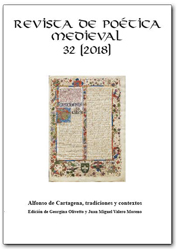Aristotle in four consejeros de magnates: Cartagena, Valera, Margarit y Chinchilla
DOI:
https://doi.org/10.37536/RPM.2018.32.0.65500Keywords:
Classical Tradition, Aristotle, Nicomachean Ethics, Moral Philosophy, Mirror of PrincesAbstract
The presence of Aristotle (principally the Nicomachean Ethics) in the Doctrinal de caballeros of Alfonso de Cartagena c. 1444; four works by Diego de Valera created in the course of four decades especially the Doctrinal de príncipes for Fernando of Aragon, the future Catholic Monarch; the Corona regum of Joan Margarit, c. 1468 and also dedicated to Fernando; and the Exhortación o información de buena y sana doctrina compiled by Pedro de Chinchilla c. 1467 for the young Alfonso XII. All these treatises de regimine principum draw on Aristotle, either directly or via florilegia, and differ in their treatment of the text.
Downloads
Métricas alternativas
Downloads
Additional Files
Published
How to Cite
Issue
Section
License
The opinions and facts stated in each article are the exclusive responsability of the authors. The University of Alcalá is not responsible in any case for the credibility and aunthenticity of the studies.
Authors will retain the rights on their work, even if they will be granting the journal a non-exclusive right of use to reproduce, edit, distribute, publicly communicate and show their work. Therefore, authors are free to enter into additional, independent contracts for non-exclusive distribution of the works published in this journal (such as uploading them to an institutional repository or publishing them in a book), as long as the fact that the manuscripts were first published in this journal is acknowledged.
Works are published under the terms stipulated in the Attribution-NonCommercial-ShareAlike 4.0 International License (CC BY-NC-SA 4.0) that allows third parties to share the work under the following conditions:
Attribution — You must give appropriate credit, provide a link to the license, and indicate if changes were made. You may do so in any reasonable manner, but not in any way that suggests the licensor endorses you or your use.
NonCommercial — You may not use the material for commercial purposes.
ShareAlike — If you remix, transform, or build upon the material, you must distribute your contributions under the same license as the original.










